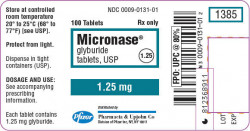Micronase (glyburide) Coupons, Discounts & Cost
Micronase (glyburide) is used in the treatment of diabetes mellitus type 2. One way to save money on the Micronase retail cost regardless of income and insurance status is to use Micronase coupons or discount cards from RXCoupons. Use this Glyburide coupon at this online pharmacy and receive up to 75% off the sale price.
When should I use Micronase?
Micronase (glyburide) is used in the treatment of diabetes mellitus type 2. It is often used in combination therapy with insulin (blood glucose level monitoring on a daily basis).
As an oral hypoglycemic agent, glyburide stimulates the secretion of insulin, increases insulin sensitivity and inhibits lipolysis in adipose tissue. This is a drug with pancreatic and hypolipidemic effect.
What should I know about Micronase contraindications?
Micronase (glyburide) contraindications: hypersensitivity, diabetes mellitus type 1 (including children and adolescents), diabetic ketoacidosis, diabetic precoma and coma, hyperosmolar hyperglycemic state, microangiopathy, liver or renal failure, burns, major surgery, intestinal obstruction, gastroparesis, infectious diseases, leukopenia, pregnancy, lactation.
Use Micronase with caution: fever syndromes, alcoholism, adrenal insufficiency, thyroid disease (hypothyroidism or hyperthyroidism).
Micronase dosage and administration
The dose depends on the patient’s age, severity of diabetes, etc. The average daily dose ranges from 2.5 to 15 mg 1-3 times a day for 20-30 minutes before eating. The maximum daily dose is 20 mg. Note that doses higher than 15 mg per day do not improve the hypoglycemic effect. The starting dose in elderly patients is 1 mg per day.
If the daily dose is not sufficiently effective (4-6 weeks of therapy), you should consult a doctor and choose another drug.
Do not administer simultaneously with MAO inhibitors, coumarin derivatives, salicylates, anabolic agents, beta-blockers, chloramphenicol.
What should I know about Micronase side effects?
Some of the side effects that can occur with Micronase (glyburide): hypoglycemia (in patients who do not have an adequate diet), weight gain, fever, arthralgia, proteinuria, allergic reactions (skin rash, itching), dyspepsia (nausea, diarrhea, feeling of heaviness in the epigastric), neurological disorders (paresis, sensory disturbances), violations of hematopoiesis (hypoplastic or hemolytic anemia, leukopenia, agranulocytosis, pancytopenia, eosinophilia, thrombocytopenia), hepatic dysfunction (cholestasis), cutaneous porphyria, polyuria, photosensitivity, headache, fatigue, weakness, dizziness.
Allergic reactions: skin rash, itching.
Dyspeptic disorders: nausea, diarrhea, feeling of heaviness in the stomach.
Uncommon disorders: neurological disorders (paresis), disorders of blood (pancytopenia), disorders of the liver (cholestasis), photosensitivity (increased sensitivity to sunlight), headache, fatigue, dizziness.
Overdose symptoms: hypoglycemia (sweating, severe weakness, palpitations, tremor, anxiety, headache, dizziness, insomnia, irritability, depression, cerebral edema, impaired speech and vision, impaired consciousness), hypoglycemic coma.
Micronase special instructions
It is necessary to regularly monitor blood sugar levels (on a regular basis).
Patients should know about the high risk of hypoglycemia in case of reception of ethanol and NSAIDs (including abdominal pain, nausea, vomiting, headache).
Patients should avoid staying in the sun for a long period of time during treatment.
Patients must be careful when driving during the period of treatment.
Micronase drug interactions
ACE inhibitors (captopril, enalapril), cimetidine, antifungal drugs (miconazole, fluconazole), NSAIDs (phenylbutazone, azapropazone, oxyphenbutazone), fibrates (clofibrate, bezafibrate), ethionamide, salicylates, coumarin-type anticoagulants, anabolic steroids, beta-blockers, MAO inhibitors, long-acting sulfonamides, cyclophosphamide, biguanide, chloramphenicol, fenfluramine, acarbose, fluoxetine, guanethidine, pentoxifylline, tetracycline, theophylline, reserpine, bromocriptine, disopyramide, pyridoxine, insulin and allopurinol may enhance the effect of Micronase.
Barbiturates, epinephrine, clonidine, antiepileptic drugs (phenytoin), carbonic anhydrase inhibitors (acetazolamide), thiazide diuretics, chlorthalidone, furosemide, triamterene, asparaginase, baclofen, danazol, diazoxide, isoniazid, morphine, ritodrine, salbutamol, terbutaline, glucagon, rifampicin, thyroid hormones, nicotinic acid, chlorpromazine, oral contraceptives and estrogens may weaken the effect of Micronase.
Ammonium chloride, CaCl2, ascorbic acid (at high doses) may increase the effect of Micronase.

